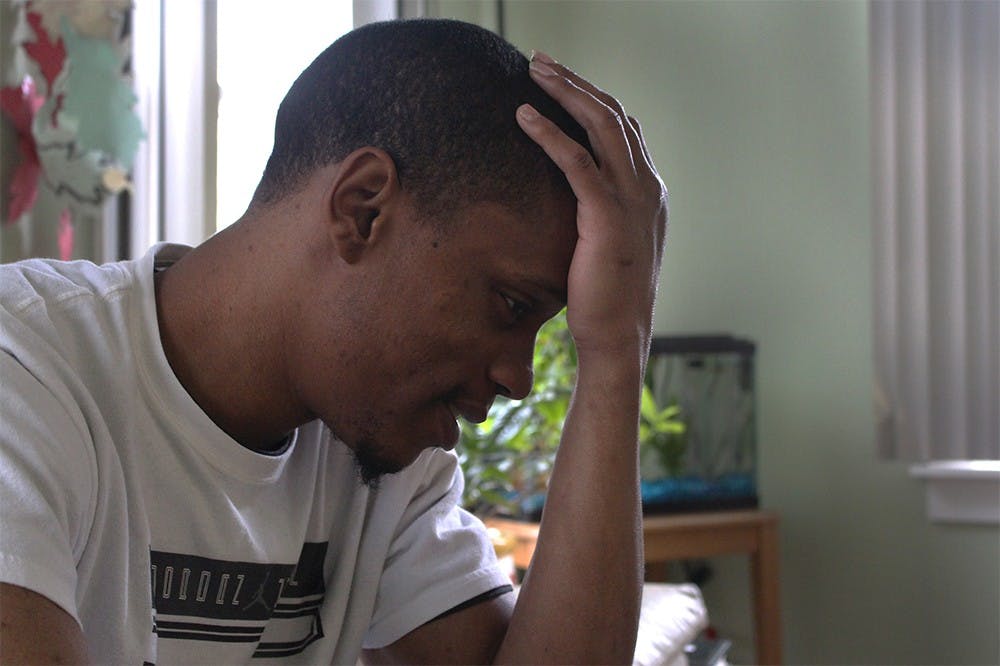They had been given a chance to rehabilitate through Mental Health Court under the guidance of Judge Kenneth Todd.
On that rainy morning in February, the preventative court was only in its first month.
Mental Health Court is meant to ensure that people struggling with mental health concerns make their meetings, take medications and find a secure living situation.
Monroe County has done what it can to address an increasing number of mental health-related cases in the justice system; the new preventative court is the latest of these attempts.
Todd just cannot be sure that it will work.
***
Mental Health Court usually starts at 8 a.m., but that Tuesday morning, Todd was late. The participants chatted idly to pass the time. They talked about boyfriends or girlfriends, new apartments and fresh tattoos. A bored-looking officer popped his ?bubblegum.
When the judge arrives, one of the first to be called to his bench is a young man in a faded blue shirt. Soft-spoken and polite, James Roberts explains his living situation to Todd. Roberts has schizophrenia, and it had only been two weeks since he was released after a year in jail.
Nothing about jail was easy. Although he was able to get his medications during his stay, he said the drugs hardly helped. He felt like there was no air to breathe.
During his year in jail, he saw many of the same people come and go. Those with a mental illness oftentimes didn’t know how to help themselves, Roberts said.
When Roberts came to jail, he decided it would be his last stay. He had been locked up before and couldn’t do it anymore. He comes from bad circumstances in Indianapolis, he says, and now he deserves better.
“There were some things I went through that I shouldn’t have to go through anymore,” Roberts said.
Now, his housing is uncertain. For the moment, he’s staying in a rehab center run by Centerstone, Bloomington’s behavioral healthcare provider.
Todd is pleased with Roberts’ progress. The rest of the participants give him a hearty round of applause.
But not everyone does as well as Roberts. Of the 10 to 12 people enrolled, Todd said three have already had significant issues in the first two weeks.
Jeremy, one of the court participants, has gotten off track with his group meetings. Todd is concerned he is living in a cheap motel where many people battling addiction stay. He instructed Jeremy to find a new place to live.
“Jeremy,” Todd said. “You’re like a roller coaster.”
***
Bloomington has never been a “nail ’em and jail ’em” sort of community, Todd said. He said he thinks Monroe County has long been perceived as a state leader in trying to find alternatives to incarceration.
Monroe County has a well-established Drug Treatment Court, which serves as the model for the new Mental Health Court. Dealing with people who are experiencing mental illness is a different kind of beast than dealing with drug addicts.
“There is not nearly as much research available, nor is there any established protocol for dealing with the mentally ill,” Todd said.
Motivating people to be compliant is always hard, and that most of the participants are homeless or struggling to find housing doesn’t help.
David Carrico, director of adult recovery at Centerstone, said Monroe County attracts homeless people because Bloomington is known to have better resources than many surrounding counties.
Centerstone is heavily dependent on Medicaid, but will often treat people even if they don’t have healthcare coverage.
A lack of resources is a challenge in most places, even Bloomington. Mental health courts depend on community organizations like Centerstone in order to function.
“Compared to a lot of other communities, we’ve got a lot of resources,” Todd said. “Compared to what we need, we don’t have nearly enough.”

In an ideal world, Roberts would have his own apartment and a job where he can work with his hands, he said. But with a felony on his record, that might not be so easy.
Outside the jail, Roberts does what he can to stay positive. More than anything, he wants to gain back his ?independence.
For the time being, he needs to make his meetings, stay away from the substances that got him in trouble and keep his schizophrenia ?under control.
In the meantime, he walks on the B-line trail and outplays everyone on his YMCA basketball team. Working his muscles helps to clear his head.
Sometimes he writes lyrics, too. Roberts hasn’t written them down anywhere. They’re just in his head.
“I’m ready to act cool/ they know me, I don’t need no crew/ what it be like, see me in the streets like a beast like/ coming from the gutter gotta eat like/ hold on ?tight ...”
Mental Health Court convenes again, and Roberts is doing better than ever. He is in a class to earn his GED and is working on applying for a job. Maybe soon he can get into his own apartment and move out of Amethyst House.
Todd tells him every week he’s proud.
“You see the value of doing this, and you’re working hard at doing the right things,” Todd tells Roberts. “There’s not too much we can do to recognize folks who do well here.”
Still, he has a gift for Roberts to recognize him for his hard work — a voucher so he won’t have to pay for his next urine screen.
When Jeremy comes back to Mental Health Court, this time it’s in an orange jumpsuit. Jail is not agreeing with him.
“I’m going through straight torture in my head,” he said.
The judge prompts Jeremy to remember why they had to send him back to jail.
“Because I had possession of someone else’s prescription medications,” Jeremy said.
Todd isn’t satisfied.
“It’s to try to help you wind up in a better situation,” Todd said. “Everyone here has reached out a hand to you.”




